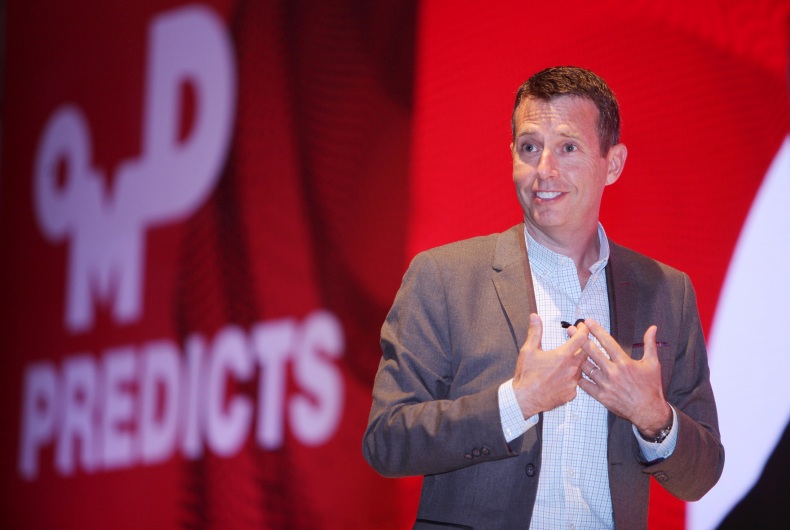For David Plouffe, known not only as a political strategist but also as the Chief Advisor to Uber, data has a purpose that transcends beyond business and performance led decisions. Best known for managing Barack Obama’s successful 2008 presidential campaign, and later also the 2011-2013 campaign, Mr Plouffe is of the opinion that data has the power to unlock value in finer details, and predict future growth models for companies.
Drawing comparison to experiences and lessons from the Obama campaign, he addressed audiences at the OMD Predicts conference to share insights on the role that data played for a company such as Uber.
“Every decision we had made during the Obama campaign was based more on data-led insights than on instincts,” he said. Much of the campaign was about optimizing data and looking for specific and targeted nuances that could better assist in connecting with, and engaging, the voters.
Mr Plouffe also advised that it was important for creators to not confuse their mindsets with the consumer’s. “I was constantly amazed at the number of times when I thought that a message is silly but it was dead-on target and something that I reckoned was nicely done, was well off the mark. But then, I was not the target voter. This is an important difference to remember,” he said, adding, “There is an absolute necessity to understand that there are solutions out there, which more important than our opinions.”
Data Led Decisions Make A Difference
It is important for organizations to be data conscious across their structures, most importantly at the top. Most major companies and brands face the challenge of data stuck in silos, missing out on the opportunity to be a tool that can complement the experience of the various teams in their decision making. “It is a challenge on how companies can convince their people to believe in the power of data and analytics and make every decision based on it,” Mr Plouffe cautioned.
Once again drawing from the Obama campaign experience that had access to both traditional and modern data sets, he pointed out that when companies, or campaigns, have access to large sample models they realize the world is not as volatile as presented. “There is volatility but not as much; you get a real and a clearer picture,” he informed.
The Holy Grail of all the efforts however eventually rests in handling trust. For some people this comes from influencers in personal life, who help them take a final decision. “Trust is crucial, and for many decisions, people trust someone they know. It can be a spouse or a sibling or a friend or someone they look up to, but the real value is to have the ability to facilitate that trust,” Mr Plouffe said.
Convenience & Speed
My Plouffe discussed Uber’s continued approach to keep delivering on a bar that is constantly on the rise. Unlike other markets, where Uber is the more affordable option, in the UAE, it is skewed towards the luxury side – an area that needs to change for the brand to grow. “People who have the means have always managed to get around. It is the segment with lesser means that are key consumers of services such as Uber,” Mr Plouffe observed.
Another cornerstone of Uber’s success is convenience, where speed is critical. “It has to be as simple as someone picking up your car keys. In most of our markets, the barrier is three minutes in wait time. Anything more than that and it means unhappy riders,” he said.
He explained that Millennials especially put a significant premium on time, citing a study that Millennials avoid cereals as it takes too much time to clean up after. “Speed is important, it can kill a brand. If someone was searching for the nearest place to vote and it took more than 10 seconds we knew we lost the voter, and we may not get that voter back,” he divulged. The speed bar is raised high in the industry itself. Even the likes of Amazon have taken the instant delivery in some markets, indicating that consumers like getting what they want, when they want it.
Changing Behavior
Uber’s future is deeply rooted in the insight that there is behavioral change on the horizon. Around 10 percent Millennials, among Uber users in the United States, have already given up their cars. In the United Kingdom, Millennials are not purchasing cars like their predecessors. There is early adoption of this change in behavior in the newer generation. UberPool is a success story from the brand that has enabled fewer cars on the road, making a difference to congestion in the city. Uber has also announced Uber Central, where users can pre-order cars.
Mr Plouffe asserted on the importance of consistency in service across its products, across a city and across a market.
“The combination of rich data and qualitative insights is powerful. We are constantly experimenting in engineering the product so that we account for every variable, giving our customers the most accurate information, predicting behavior and using smart data to bring consistency to the experience,” he said.





